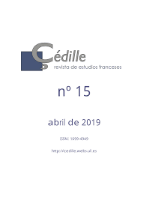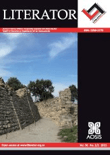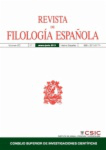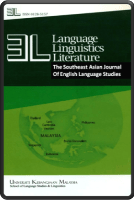
Folia Linguistica et Litteraria
Scope & Guideline
Fostering Dialogue Between Linguistics and Literature
Introduction
Aims and Scopes
- Linguistic Analysis:
The journal emphasizes linguistic studies, including syntax, semantics, and pragmatics, offering insights into language structure and use across different contexts. - Literary Criticism:
A core focus is on literary analysis and criticism, examining texts from various cultural and historical perspectives, enabling a deeper understanding of narrative techniques and thematic explorations. - Cultural Studies:
The journal integrates cultural studies, analyzing how language and literature reflect and shape societal values, norms, and identities, particularly in the context of contemporary issues. - Translation Studies:
There is a significant emphasis on translation studies, addressing the complexities of translating literary and specialized texts, and exploring the cultural implications of translation. - Educational Approaches:
Folia Linguistica et Litteraria also delves into pedagogical strategies for language and literature teaching, focusing on innovative methods and curriculum development in educational settings.
Trending and Emerging
- Digital Humanities:
Recent publications indicate a growing trend towards integrating digital tools and methodologies in literary and linguistic research, enhancing the analysis and accessibility of texts. - Interdisciplinary Approaches:
There is an emerging focus on interdisciplinary studies that blend language, literature, psychology, and sociology, reflecting a holistic understanding of texts and their societal impacts. - Postcolonial and Gender Studies:
Themes related to postcolonialism and gender studies are gaining traction, as researchers explore the complexities of identity, representation, and power dynamics in literature. - Ecocriticism:
A notable rise in ecocritical perspectives is evident, with scholars examining the relationship between literature and environmental issues, emphasizing the role of narrative in ecological discourse. - Language and Technology:
The intersection of language and technology is increasingly relevant, with papers exploring how digital communication affects language use and societal interactions.
Declining or Waning
- Traditional Literary Forms:
There appears to be a decrease in the analysis of traditional literary forms and canonical texts, as researchers increasingly focus on contemporary and diverse narratives. - Historical Linguistics:
The interest in historical linguistics has declined, with fewer studies examining the evolution of language over time, possibly overshadowed by more pressing contemporary linguistic issues. - Static Language Teaching Methods:
There is a noticeable reduction in discussions around static or traditional language teaching methods, as the field moves towards more dynamic, technology-enhanced pedagogical approaches.
Similar Journals

BULLETIN HISPANIQUE
Exploring the Depths of Spanish-Speaking CulturesBULLETIN HISPANIQUE, published by PRESSES UNIV BORDEAUX, is a prominent academic journal dedicated to the interdisciplinary exploration of literature, linguistic studies, and historical analysis related to the Spanish-speaking world. Since its inception in 1972, the journal has established itself as a vital resource for researchers and scholars, achieving notable recognition across various categories—most recently characterized as Q2 in History, Q3 in Linguistics and Language, and Q1 in Literature and Literary Theory for the year 2023. Though it operates under traditional access models, BULLETIN HISPANIQUE maintains a commitment to scholarly excellence, offering insightful articles that contribute to the rich tapestry of cultural and linguistic discourse. With its Scopus rankings reflecting significant academic engagement, the journal serves as an essential platform for dialogue and discovery in the arts and humanities, appealing to a diverse audience of students, professionals, and academics committed to advancing knowledge in these vital fields.

Philologica Canariensia
Fostering innovation in humanities scholarship.Philologica Canariensia is a distinguished academic journal published by the University of Las Palmas de Gran Canaria, focusing on the vibrant fields of Literature and Literary Theory as well as Linguistics and Language. With an impact factor that positions it in the Q1 and Q2 quartiles in its respective categories as of 2023, the journal has established itself as an important platform for scholarly communication and research. Since transitioning to Open Access in 2014, it has broadened its reach, allowing researchers, professionals, and students from around the globe to access high-quality publications without barriers. With a commendable presence in Scopus rankings, including a rank of #309 out of 1106 in Literature and Literary Theory, Philologica Canariensia aims to foster an interdisciplinary dialogue and advance knowledge in the humanities. The journal's commitment to publishing innovative research makes it an essential resource for anyone engaged in exploring linguistic and literary phenomena.

Cedille-Revista de Estudios Franceses
Fostering Global Dialogue in French Linguistics and Literary TheoryCedille-Revista de Estudios Franceses is a prominent academic journal published by the ASOC PROFESORES FRANCES UNIV ESPANOLA-APFUE and has established itself as a vital resource in the fields of Linguistics and Language and Literature and Literary Theory. Since its inception in 2005, this Open Access journal has provided a platform for rigorous scholarly articles and critical studies focused on French studies, fostering both research and discussion among academics from around the globe. Originating from Santa Cruz de Tenerife, Spain, Cedille has garnered a respectable impact factor and ranks in the second quartile for Linguistics and Language and the first quartile for Literature and Literary Theory in 2023. With converged years from 2009 to 2024, the journal aims to advance understanding and appreciation of French literature and its linguistic intricacies, serving as a vital forum for researchers, professionals, and students committed to the exploration of French culture and language studies.

Dacoromania
Bridging ideas and cultures through language and literature.Dacoromania, published by the esteemed EDITURA ACAD ROMANE, is an Open Access academic journal that has been contributing to the fields of Linguistics, Language, Literature, and Literary Theory since 2011. With a mission to foster scholarly dialogue and facilitate knowledge dissemination, the journal enables researchers, professionals, and students to access a wealth of innovative research and critical scholarship without barriers. Although currently classified in the Q4 quartile for its categories in Linguistics and Literature, Dacoromania aspires to enhance its visibility and impact within these disciplines, providing a platform for emerging voices and ideas from Romania and beyond. The journal is openly accessible and invites submissions that push the boundaries of linguistic and literary studies, ensuring a vibrant exchange of thought in a rapidly evolving academic landscape.

Literator-Journal of Literary Criticism Comparative Linguistics and Literary Studies
Challenging Paradigms in Literary and Linguistic ScholarshipLiterator - Journal of Literary Criticism, Comparative Linguistics and Literary Studies, published by AOSIS, is a prestigious open-access journal that has been serving the academic community since 1980. With an ISSN of 0258-2279 and an E-ISSN of 2219-8237, this journal provides a vital platform for the dissemination of innovative research in the fields of linguistics and literary studies. The journal proudly maintains an impactful presence within the academia, marked by its 2023 categorization in Q2 for Linguistics and Language and Q1 for Literature and Literary Theory. With impressive Scopus rankings—132nd in Literature and Literary Theory and 448th in Language and Linguistics—it represents the intersection of critical engagement and scholarly inquiry. Literator's commitment to open access fosters inclusivity and broadens the reach of scholarly work, making high-quality research accessible to all. The journal’s scope encompasses critical analyses, comparative studies, and linguistics, inviting contributions that shape and challenge current paradigms. As it converges from 2014 to 2024, Literator continues to illuminate the rich tapestry of literary discourse and linguistic understanding, appealing to researchers, professionals, and students eager to expand their knowledge in these dynamic fields.

Archivum
Advancing Scholarly Excellence in the HumanitiesArchivum, published by UNIV OVIEDO in Spain, stands as a vital resource in the fields of Linguistics and Language as well as Literature and Literary Theory. With an impact factor reflective of its commitment to scholarly excellence, this journal has proudly maintained an Open Access model since 1951, ensuring that its rich repository of knowledge is freely available to researchers, professionals, and students alike. Covering a converged span from 2019 to 2023, Archivum has strategically positioned itself within the academic milieu, currently categorized in the Q4 for Linguistics and Language and Q3 for Literature and Literary Theory as of 2023. The journal is indexed in Scopus, with rankings that reflect its growing influence, such as #690 in Literature and Literary Theory and #887 in Language and Linguistics. Despite its challenges in visibility, Archivum remains essential for those seeking to engage with contemporary discussions and research within the humanities. Located in the heart of Asturias, it embodies the scholarly spirit of Spain, fostering a collaborative environment for innovation and inquiry in linguistic and literary studies.

British and American Studies
Bridging Cultures, Inspiring DiscourseBritish and American Studies, published by EDITURA UNIV VEST, is a pivotal open-access journal that fosters scholarly discourse in the fields of Cultural Studies, Linguistics, and Literature. Established with the aim of bridging gaps between British and American socio-cultural contexts, the journal provides a platform for researchers, professionals, and students to explore complex themes through critical analysis and innovative perspectives. With its ISSN 1224-3086 and E-ISSN 2457-7715, the journal has maintained an impressive impact factor, achieving ranking in Q2 and Q3 quartiles as of 2023 across multiple categories, positioning itself as a relevant voice in the academic community. As an open-access publication since 2015, it endeavors to ensure that research is available to a broad audience, thereby enhancing the dissemination of knowledge within the humanities. As it converges towards its future goals from 2018 to 2024, "British and American Studies" continues to invite transformative and enterprising contributions that challenge existing paradigms and fuel academic inquiry.

REVISTA DE FILOLOGIA ESPANOLA
Redefining the Boundaries of Spanish Philological StudiesREVISTA DE FILOLOGIA ESPANOLA is a distinguished academic journal dedicated to the fields of linguistics and literature, published by the CONSEJO SUPERIOR INVESTIGACIONES CIENTIFICAS (CSIC) since 1954, and has been an Open Access journal since its inception. Situated in Madrid, Spain, this journal has emerged as a crucial platform for the dissemination of scholarly research, with notable rankings including Q2 in Linguistics and Language and Q1 in Literature and Literary Theory as of 2023. The journal's commitment to fostering academic dialogue is reflected in its impressive Scopus rankings, including a 79th percentile in the Arts and Humanities for Literature and Literary Theory. Covering a wide range of topics from linguistic theory to literary critique, REVISTA DE FILOLOGIA ESPANOLA is essential reading for researchers, professionals, and students alike, providing valuable insights and cutting-edge research in the ever-evolving landscape of Spanish philology.

3L-Language Linguistics Literature-The Southeast Asian Journal of English Language Studies
Navigating Contemporary Issues in Southeast Asian Language Studies3L-Language Linguistics Literature - The Southeast Asian Journal of English Language Studies is a prestigious academic journal published by Penerbit Universiti Kebangsaan Malaysia, showcasing the dynamic field of linguistics, language studies, and literature. With an open access policy since 2006, this journal aims to disseminate high-quality research and critical analyses, catering to an international audience of researchers, academics, and practitioners. The journal has achieved impressive rankings, positioning it in the Q2 category for Linguistics and Language, and Q1 for Literature and Literary Theory in 2023, reflecting its significant impact in these fields as evidenced by a remarkable Scopus ranking of #27/1106 in Literature and Literary Theory, placing it in the 97th percentile. This makes 3L an essential resource for those seeking to engage with contemporary issues and innovations within the Southeast Asian context and beyond. With a commitment to advancing knowledge in language and literature, 3L fosters a vibrant scholarly community dedicated to excellence in research.

Listy Filologicke
Connecting Disciplines: Where History Meets Linguistics and Literature.Listy Filologicke is a distinguished academic journal published by the Institute of Classical Studies at the Academy of Sciences of the Czech Republic, focusing on the interdisciplinary fields of History, Linguistics and Language, and Literature and Literary Theory. With an ISSN of 0024-4457 and an E-ISSN of 2570-9410, this journal has been a pivotal platform for scholarly discourse since its convergence years began in 2003. Notably, it holds a Q3 classification in History and Linguistics and Language, and a Q2 in Literature and Literary Theory as of 2023. Its rankings within Scopus illustrate its relevance and impact in academia, with noteworthy positions in the Arts and Humanities and Social Sciences categories. Researchers, professionals, and students will find Listy Filologicke an invaluable resource for exploring cutting-edge research, critical analyses, and discourse that contribute significantly to their respective fields. Based in the heart of the Czech Republic, it continues to promote scholarly excellence and foster international collaboration.